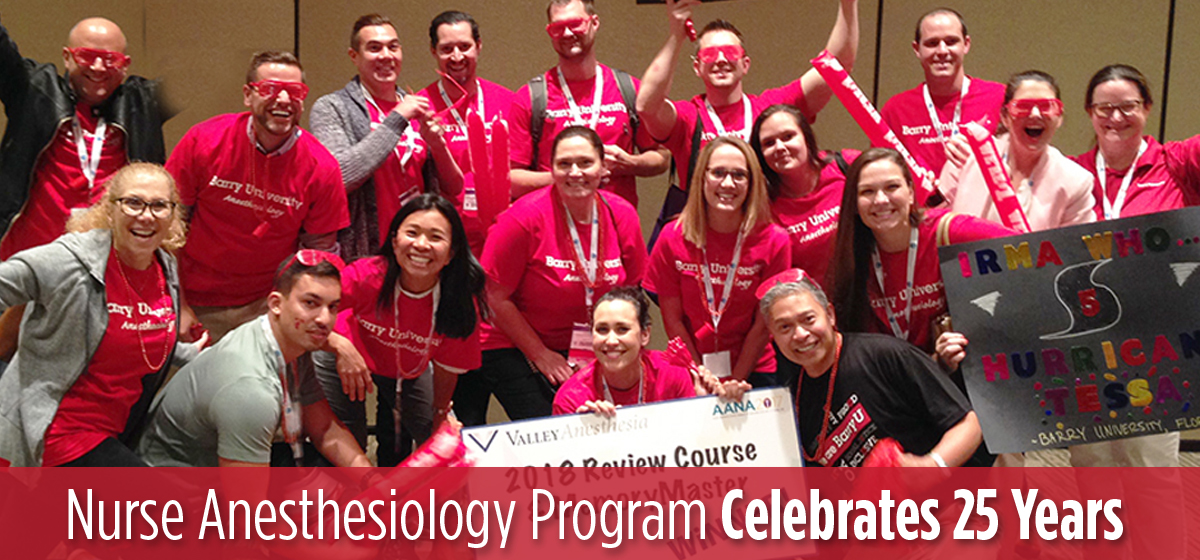Explore 25 Years of the Anesthesiology Program
Much has changed since 1995, the year Barry University graduated its first Master of Science in Anesthesiology class. Many distinguished alumni have returned as faculty and mentors, the student body has diversified and grown, and clinical training sites that once numbered in the single digits are now located throughout the state of Florida. The program itself has evolved, too, adding a post-graduate Doctor of Nursing Practice (DNP) with a Specialization in Anesthesiology degree in 2012. (The program recently completed its full transition from a Master of Science to a Doctor of Nursing Practice.) An entry-level post-baccalaureate DNP was also introduced, and that program’s inaugural class will graduate in 2021. But for all these advancements, the core mission of the program remains steadfast: To educate and graduate exemplary nurse anesthetists.
Program Director and Associate Professor of Anesthesiology Rebecca Lee, DNP, CRNA, APRN, enjoys a long-range view of the department’s consistent pursuit of excellence. Lee graduated with the Class of 2000 and devoted much of her career to mentoring students and researching educational practices before returning to join Barry’s faculty. By her measure, the department’s emphasis on clinical training and experiential learning through simulation makes Barry grads the most desirable job candidates. “It often gets back to me that a Barry Nurse Anesthesiology graduate is the best hire!” she says. “They complete more than 2,000 clinical hours and train to be independent practice providers. Barry graduates also receive three times more pharmacology and pathophysiology than other programs.”
As Program Director, Lee has been intimately involved in the transition from a Master of Science to a DNP with Specialization in Anesthesiology. “The program was previously 54 credits. Now our graduates complete the program in three years with 86 credits,” she says. “The program has also evolved to incorporate more active simulation and experiential learning. [We have] two well-equipped simulation labs, in Orlando and Hollywood, where innovative simulation scenarios are delivered by enthusiastic faculty. Back in 1993, when the program first began, there were no areas to simulate anesthesiology skill sets. Graduates now enjoy learning difficult airway maneuvers and regional ultrasound skills in a simulated environment with state-of-the-art equipment.”
Whether by embracing advanced technology or adjusting to the needs of new student cohorts, keeping the curriculum fresh and current continues to be a priority for the program. John McFadden, PhD, CRNA, APRN, and Dean of the College of Nursing and Health Sciences, credits Barry’s faculty and staff, who practice, hold leadership positions at a variety of professional associations, and regularly publish their research. “Our faculty are immersed in the current issues of nurse anesthesiology and that keeps our curriculum contemporary,” he says. “Equally important, the faculty are committed to adapting to the changing needs of today’s students. They are mindful of our demographic and cultural shifts, changing student needs, and the evolving use of technology in teaching and in anesthetizing locations.”
Both Lee and McFadden are enthusiastic about the program-wide implementation of new learning tools. Specifically, they look forward to growing interdisciplinary participation in simulation events, exposing nurse anesthesiology students to learners from multiple healthcare disciplines. “These team-oriented simulations are the wave of the future and necessary for students to understand that healthcare providers do not work in silos,” says Lee. “Interprofessional education (IPE) will be an integral part of the next 25 years at Barry.”
Of course, Barry’s esteemed Nurse Anesthesiology alumni have a critical hand in the program’s continued success and evolution. “Our alumni often serve as clinical and didactic faculty, refer excellent candidates to the program, mentor students in their doctoral projects, and further the reputation of the program,” says McFadden. Such strong leadership among Barry graduates is no accident. Since its inception, the program has sought to prepare its students to assume leadership roles in the anesthesiology field. According to Tony Umadhay, PhD, CRNA, APRN, and Associate Dean of the College of Nursing and Health Sciences, the program’s emphasis on faculty mentorship plays a critical role in preparing the next generation of leaders. “The Anesthesiology faculty serve as nursing exemplars and role models,” he says. Umadhay acted as Nurse Anesthesiology Program Director from 2007 to 2015 — a period during which enrollment grew and clinical training opportunities diversified — and he continues to teach in the program. Previously, he was president of the Florida Association of Nurse Anesthetists and served on the National Board of Certification and Recertification of Nurse Anesthetists. He’s won several awards for his own leadership so values Barry’s commitment to training students who will one day guide others in the field. This training is woven throughout each student’s experience at Barry. “Theoretical principles of leadership on effective communication, interdisciplinary collaboration, and building consensus are all threaded throughout the curriculum,” says Umadhay. “Students are then exposed to intentional learning activities on advocacy and leadership.” The idea, he says, is to produce “well-rounded nurse anesthetists who are not only clinical experts but also competent leaders.” Barry’s Nurse Anesthesiology alumni are the greatest proof that such leadership training is paying off.
25 years of exceptional education in Nurse Anesthesiology deserves a certain amount of fanfare. In a pre-COVID-19 world, the Class of 1995, fellow alumni, and Barry faculty had planned to gather in October at the annual Florida Association of Nurse Anesthetists (FANA) conference for a proper, face-to-face celebration of our collective accomplishments. Though we are unable to reconnect, reminisce, and toast this major milestone in person, we pay tribute nonetheless to the faculty, students, and alumni that shape Nurse Anesthesiology at Barry, and the numerous ways in which our first-ever graduates helped carve a path for the generations that have followed.

